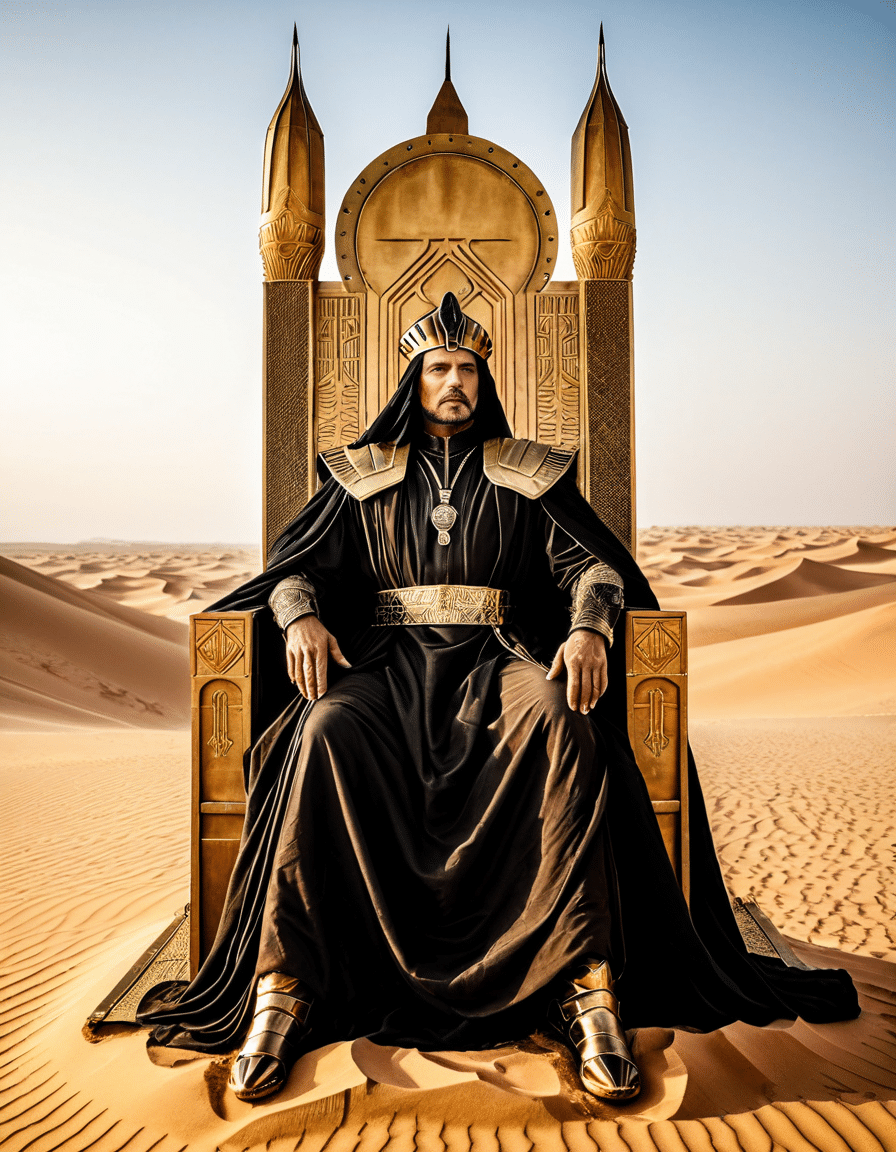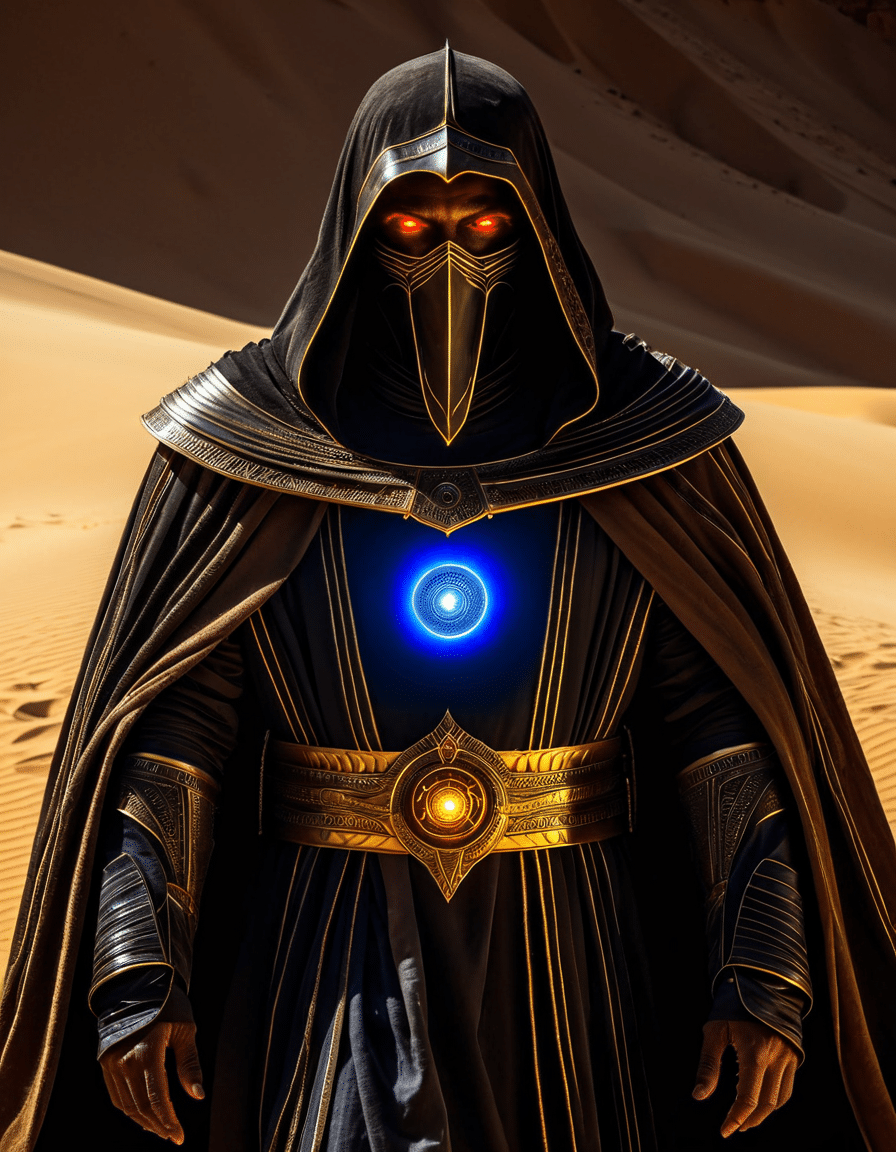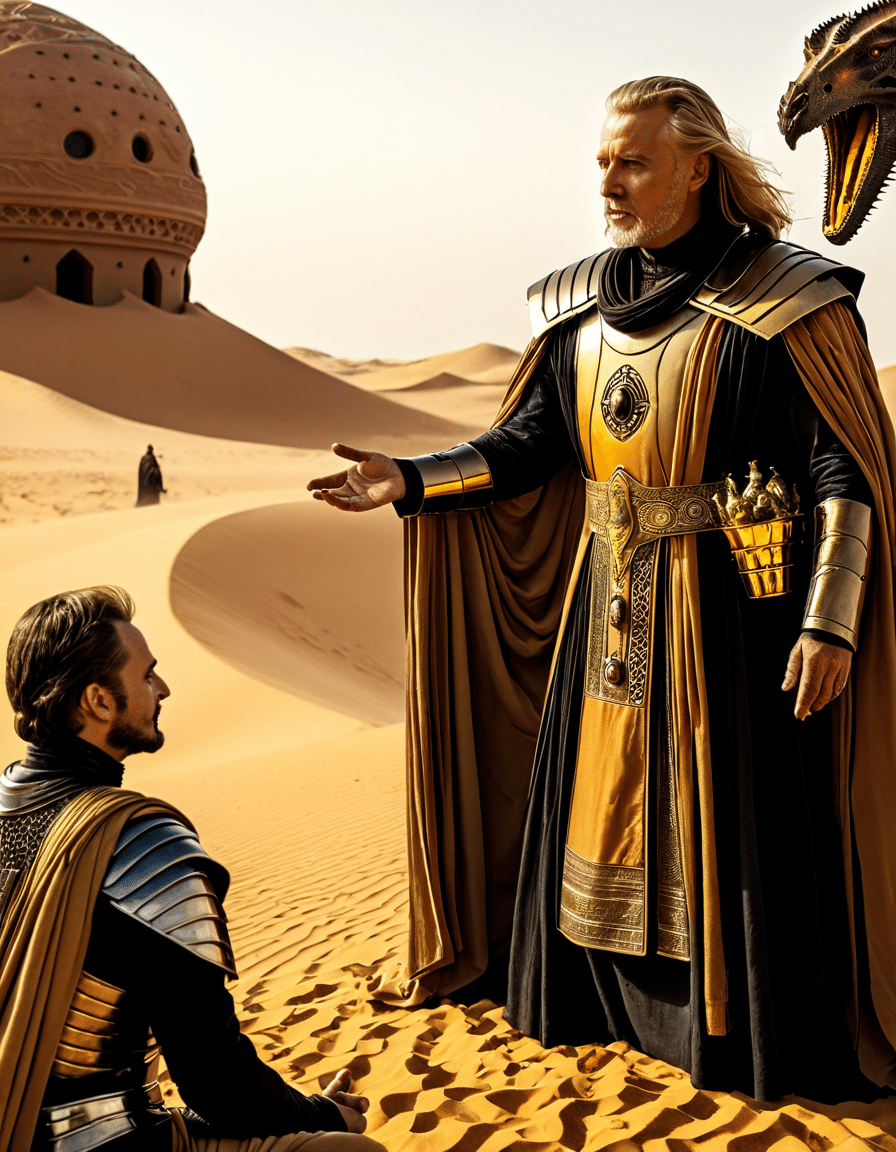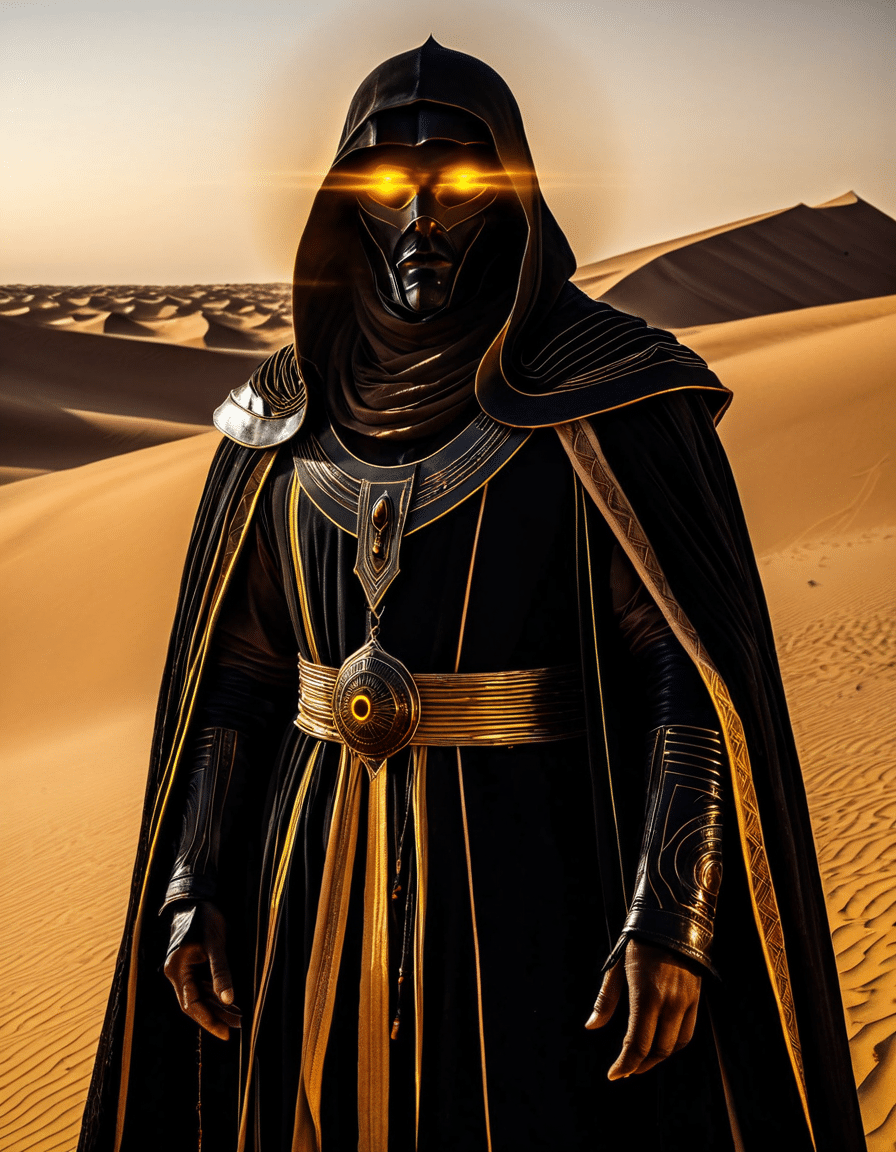
God Emperor Of Dune Master Of Power And Destiny In Sci Fi
The God Emperor of Dune, the fourth installment of Frank Herbert’s legendary Dune series, has sparked passionate discourse among sci-fi fans and scholars alike since its release in 1981. This pivotal work isn’t just a book; it’s a deep dive into the swirling waters of power, destiny, and how societies evolve. In today’s cultural climate, the themes Herbert explores feel more alive than ever. Let’s break down the intricate components of the God Emperor of Dune that contribute to its enduring legacy.

7 Key Features That Define the God Emperor of Dune’s Mastery Over Power and Destiny
1. Dual Nature of Leadership
Leto II Atreides stands as a compelling figure—both tyrant and savior. His transformation into a human-sandworm hybrid isn’t just a sci-fi twist; it’s a profound commentary on the sacrifices made for the greater good. Herbert skillfully crafts a narrative that raises hard-hitting questions about what it means to lead. It prompts readers to reflect on the unique burdens that come with power and authority.
The dichotomy in Leto II’s character is fascinating. While he embodies absolute power, his actions are rooted in a desire to protect humanity. This complexity mirrors real-life leadership dilemmas, where the lines between heroism and tyranny often blur.
2. Prescience and Its Burden
Leto II’s prescient abilities grant him a leg up on understanding the future, but what’s the cost? This power ties him in knots of existential dread, showcasing how foreknowledge can lead to despair rather than peace. In the God Emperor of Dune, Leto’s struggle with his abilities presents a stark reality: knowing one’s fate can often nullify the possibility of free will.
Readers can feel the psychological toll of such burdens. As they traverse Leto’s experiences, it becomes crystal clear that the weight of leadership and foresight isn’t a glamorous burden; it’s a heavy yoke that questions the very fabric of human choice.
3. Ecosystem and Social Commentary
Arrakis is not just a backdrop; it’s a crucial player in the narrative. Herbert harnesses the desert ecosystem to make a poignant commentary on environmentalism, an issue that resonates strongly today. Leto II’s reign reflects a deep understanding of ecological balance, suggesting that true power stems from the ability to manage natural resources judiciously.
The urgent discussions around climate change make Herbert’s insights more relevant than ever. By weaving environmental stewardship into his narrative, the God Emperor of Dune encourages readers to consider how mankind interacts with nature.
4. Religious Influence and Cult of Personality
The God Emperor isn’t just a ruler; he’s a figure of worship. By establishing a cult-like following, Leto II exemplifies how religion can serve as a double-edged sword in governance. His ability to weave spirituality into the fabric of his regime illustrates how leaders can manipulate faith for control—a theme that feels all too contemporary.
In today’s political landscapes, where ideologies often clash, this dynamic raises essential questions about the use of religious fervor for personal gain. Leto II’s character prompts us to ponder how closely faith and politics can intertwine.
5. Political Intrigue and Manipulation
The God Emperor of Dune is rife with political maneuvering, showcasing rivalries among factions such as the Bene Gesserit and the Spacing Guild. These intrigues mirror today’s political dramas, highlighting how ambition and betrayal are ever-present in human nature. The narrative intricacies underline a timeless principle: power dynamics often propel stories forward.
The interactions among different groups provide a multi-dimensional perspective that keeps readers on their toes. Herbert’s portrayal of these relationships serves as a cautionary tale about the consequences of unchecked ambition.
6. The Concept of the “Golden Path”
Leto II’s pursuit of the Golden Path is no small feat. This principle guides his often tyrannical methods, aiming for humanity’s survival. His choice to blend oppression with guidance invokes critical conversations surrounding freedom versus security—a timeless issue relevant to the contemporary populace.
As society grapples with similar challenges, Leto II’s journey urges readers to examine the delicate balance between individual rights and collective safety. The notion of sacrifice for greater good prevails, challenging every generation to determine its own path.
7. Legacy and Influence on Sci-Fi Hierarchy
The philosophical queries and narrative techniques embedded in the God Emperor of Dune have molded the future of sci-fi literature and film. Influences can be spotted in modern classics like The Matrix and Blade Runner, where themes of control, destiny, and the essence of humanity come to life. Herbert’s work lays a rich foundation for exploring complex storytelling in contemporary media.
The narrative’s lasting impact encourages modern creators to push boundaries and intertwine social commentary with imaginative fiction. Herbert championed this blend decades ago, proving the narrative depth can lead to significant cultural shifts.

The God Emperor’s Lasting Impact on Contemporary Culture
As we look toward 2026, the themes running through the God Emperor of Dune echo with a sense of urgency. Power dynamics, sustainability, and human destiny challenge the current cultural narrative, finding relevance in both literature and film. Recent adaptations of Dune have reignited interest in Herbert’s expansive universe, inviting fresh discussions around its complex ideologies.
Leto II serves as a multifaceted ruler, sage, and martyr, sparking vital conversations about mythology’s role in leadership. Facing the pressing issues of climate crisis, social unrest, and global instability, the God Emperor of Dune offers a lens for examining our quest for a sustainable future.
Embracing Frank Herbert’s rich narrative empowers audiences to confront significant questions around power and destiny. As readers and film enthusiasts continue to wade through the intricate themes of the God Emperor of Dune, they deepen their understanding of our shared human experience. The story’s multi-layered exploration reminds us that art—like life—demands our attention, reflection, and engagement.
In conclusion, the God Emperor of Dune remains a cornerstone of science fiction, continually inviting new generations to delve deeper into its lessons. As audiences reflect on its intricate themes and implications, the saga endures as a vital conversation starter on the complexities of leadership, power, and what it means to shape destiny.
God Emperor of Dune: Fun Trivia and Interesting Facts
Legacy and Inspirations
The imposing figure of the God Emperor of Dune has roots deeper than you’d think. Frank Herbert, the genius behind the Dune saga, drew inspiration from various historical and cultural influences. Did you know that Herbert’s vision has been compared to the complexities of leadership seen in figures like Princess Caroline Of Monaco? Just as her story reflects the struggles and triumphs of royal life, the God Emperor showcases the weighty burden of power.
Another fascinating tidbit is how Herbert’s themes resonate with various cultures around the globe. For instance, the Al Aqsa mosque, a significant site in Judeo-Christian-Muslim traditions, embodies a sense of sacred authority and life-altering choices, mirroring the God Emperor’s weighty decisions that shape the universe. This intricate interplay of power and spirituality gives a deeper understanding of what Herbert was aiming for in his epic.
Character Studies and Comparisons
Leto II, the titular God Emperor of Dune, isn’t just a character but a multi-dimensional study in evolution and sacrifice. He’s been compared to real-life figures like James Dougherty, who lived a life defined by shifts between personal aspirations and imposed roles. Just as Dougherty navigated his life through society’s expectations, Leto II struggles with his duality, transforming from a man into something much more profound.
But it’s not all deep existential thought! Leto II’s transformation offers a plethora of narratives, engaging audiences while letting them ponder big ideas without losing the entertainment factor. For instance, if you’re a fan of Devon Bostick Movies And TV Shows, you might appreciate how characters transform through adversity, a theme that is also resonant in Leto’s journey. Both stories weave engaging plots while prompting us to reflect on personal evolution and societal duties.
Cultural Impact
The God Emperor of Dune has significantly influenced not just literature but pop culture across genres. It’s fascinating to see how various elements from this novel seep into modern storytelling. You might even spot Leto II’s echoes within superhero narratives, similar to the anticipated Spider-Man: Beyond the Spider-Verse release date in 2025. Much like superheroes, Leto’s character grapples with the weight of destiny and an evolving sense of identity.
In addition, films that explore eccentric characters, such as works featuring the talented Paula Prentiss, reflect the complexity found in Leto’s struggles. The God Emperor’s nuances make him unforgettable, much like a vivid character performance in cinema. Plus, this intricate narrative supports an array of adaptations, including potential reinterpretations by figures as variable as Logan Paul in WWE, who consistently showcases the drama and theatrics of character transformation. The world of Dune is an intricate tapestry, and each thread—whether it’s a key character or a philosophical idea—plays a pivotal role in the broader narrative.
In essence, the God Emperor of Dune isn’t just an exalted character; he’s a mesmerizing study of power, sacrifice, and the intricate dance of destiny, leaving a lasting impact on audiences and creators alike.










